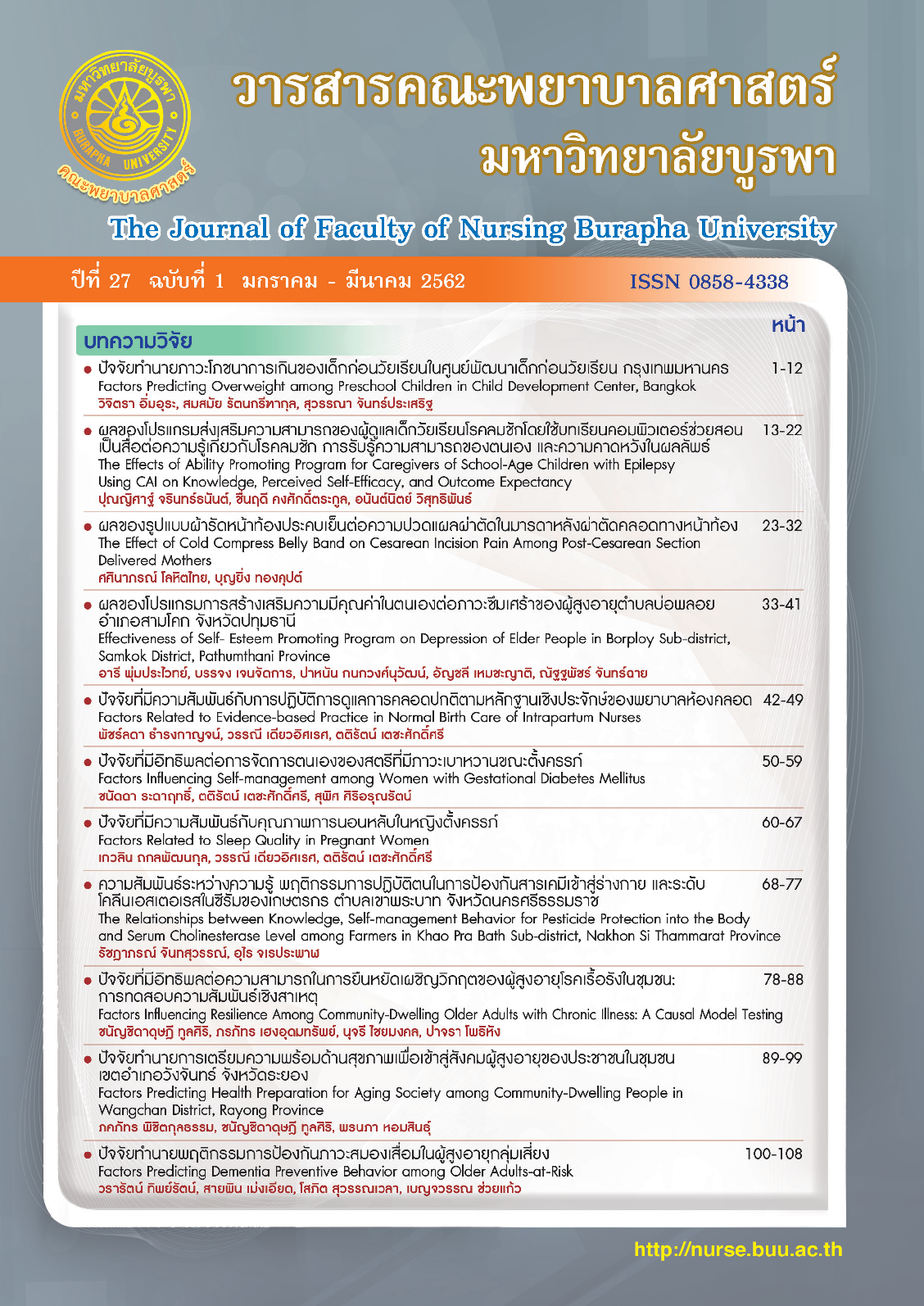ปัจจัยที่มีอิทธิพลต่อการจัดการตนเองของสตรีที่มีภาวะเบาหวานขณะตั้งครรภ์
คำสำคัญ:
การจัดการตนเอง, สตรีที่มีภาวะเบาหวานขณะตั้งครรภ์, การรับรู้สมรรถนะแห่งตน, การสนับสนุนทางสังคมบทคัดย่อ
บทคัดย่อ
การศึกษาแบบบรรยายและทำนายครั้งนี้มีวัตถุประสงค์เพื่อศึกษาการจัดการตนเองและปัจจัยที่มีอิทธิพลต่อการจัดการตนเองของสตรีที่มีภาวะเบาหวานขณะตั้งครรภ์ กลุ่มตัวอย่างจำนวน 176 รายคัดเลือกโดยวิธีการสุ่มอย่างเป็นระบบ คือ สตรีที่มีภาวะเบาหวานขณะตั้งครรภ์ที่มารับบริการ ณ โรงพยาบาลระดับตติยภูมิแห่งหนึ่ง เขตกรุงเทพมหานคร เก็บรวบรวมข้อมูลเดือนเมษายน-มิถุนายน พ.ศ. 2561 เครื่องมือที่ใช้ในการวิจัยประกอบด้วยแบบบันทึกข้อมูลทั่วไป แบบสอบถามการรับรู้สมรรถนะแห่งตน แบบสอบถามการสนับสนุนทางสังคม และแบบสอบถามการจัดการตนเอง มีค่าความเชื่อมั่นเท่ากับ .88, .96 และ .78 ตามลำดับ วิเคราะห์ข้อมูลด้วยสถิติพรรณนาและการวิเคราะห์ถดถอยพหุคูณแบบขั้นตอน
ผลการศึกษาพบว่า ค่าเฉลี่ยของคะแนนการจัดการตนเองอยู่ในระดับสูง การรับรู้สมรรถนะแห่งตนเป็นปัจจัยทำนายที่ดีที่สุดและมีนัยสำคัญทางสถิติ (β = .63) และรองลงมาคือการสนับสนุนทางสังคม (β = .27) ปัจจัยทั้งสองทำนายการจัดการตนเองของสตรีที่มีภาวะเบาหวานขณะตั้งครรภ์ได้อย่างมีนัยสำคัญทางสถิติ ร้อยละ 66.7 ผลการศึกษานี้ให้ข้อเสนอแนะว่าพยาบาลและผดุงครรภ์ที่มีหน้าที่ดูแลสุขภาพหญิงตั้งครรภ์ สามารถนำผลการวิจัยนี้ไปใช้เป็นแนวทางในการพัฒนากิจกรรมหรือโปรแกรมส่งเสริมการรับรู้สมรรถนะตนเองและการสนับสนุนทางสังคมในสตรีที่มีภาวะเบาหวานขณะตั้งครรภ์ เพื่อส่งผลให้สตรีตั้งครรภ์เหล่านั้นสามารถจัดการตนเองได้อย่างเหมาะสมและมีประสิทธิภาพ
เอกสารอ้างอิง
Al Aboudi, I., Hassali, M. A., Shafie, A. A., & Saleem, F. (2016). Self-efficacy, self-care behaviours and glycaemic control in type 2 diabetic patients in Riyadh, Saudi Arabia. Journal Public Health, 24, 281-290.
Bandura, A. (1997). Social foundations thought and action: A social cognitive. New Jersey: Prentice-Hall.
Bener, A., Saleh, N. M., & Al-Hamaq, A. (2011). Prevalence of gestational diabetes and associated maternal and neonatal complications in a fast-developing community:
Global comparisons. International Journal Women’s Health, 3, 367-373.
Bijl, J. V., Poelgeest-Eeltink, A. V., & Shortridge-Baggett, L. (1999). The psychometric properties of the diabetes management self-efficacy scale for patients with type 2 diabetes mellitus. Journal Advance Nursing, 30(2), 352-359.
Boonsatean, W., Rosner, I.D., Carlsson, A., & Ostman, M. (2016). The influences of income and
education on the illness perception and self-management of Thai adults with type 2 diabetes. Journal Diabetes Metabolic Disorder, 3(17), 1-8.
Carolan, M., Gill, G. K., & Steele, C. (2012). Women’s experiences of factors that facilitate or inhibit gestational diabetes self-management. BMC Pregnancy and Childbirth, 12(1), 99-110.
Cunningham, F. G., Leveno, K. J., Bloom, S. L., Hauth, J. C., Rouse, D. J., & Spong, C. Y. (2010). Williams obstetrics (23th ed.). New York: McGraw-Hill.
Grey, M., Knafl, K., & Mccorkle, R. (2006). A framework for the study of self and family management of chronic conditions. Nursing Outlook, 54(5), 278-286.
Gunggu, A., Thon, C. C., & Lian, C. W. (2016). Predictors of diabetes self-Management among type 2 diabetes patients. Journal of Diabetes Research. Article, 1-7.
Iamsumang, W. (2015). The development of the Thai version of the diabetes management self-efficacy scale (T- DMSES) for older adults with type 2 diabetes. Doctoral dissertation, Health and Environmental sciences, Buffalo University.
Khymdeit, E., Rao, P. A., Narayanan, P., & Mayya, S. (2016). Social support influencing diabetes self-management behaviors: A cross- sectional study in Udupi Taluk. Indian Journal of Health Sciences, 9(2), 153-157.
Kurnia, A. D., Amatayakul, A., & Karuncharernpanit, S. (2017). Predictors of diabetes self- management among type 2 diabetics in Indonesia: Application theory of the health promotion model. International Journal of Nursing Sciences, 4, 260-265.
Nateetanasombat, K. (2012). Care of women with gestational diabetes mellitus. The Journal of Faculty of Nursing, Bhurapha University, 20(3), 14-21. [In Thai]
Piboon, K., Jaidee, W., & Chailkongkit, K. (2015). A systematic review of type 2 diabetic care intervention among elderly people. The Journal of Faculty of Nursing, Bhurapha University, 23(2), 1-19. [In Thai]
Phetarvut, S., Watthayu, N., & Suwonnaroop, N. (2011). Factors predicting diabetes self- management behavior among patients with diabetes mellitus type 2. Journal of Nursing Science, 29(4), 18-26. [In Thai]
Rechenberg, K., Whittemore, R., Grey, M., Jaser, S., & TeenCOPE Research Group. (2016). Contribution of income to self-management and health outcomes in pediatric
type 1 diabetes. Pediatric Diabetes, 17(2), 120-126.
Schmitt, A., Gahr, A., Hermanns, N., Kuzer, B., Huber, J., & Haak, T. (2013). The diabetes self- management questionnaire (DSMQ): Development and evaluation of an instrument to assess diabetes self-care activities associated with glycaemic control. Health and Quality of Life Outcomes, 11(138), 1-14.
Tabachnick, B. G., & Fidell, L. S. (2008). Using Multivariate Statistics (6th Ed). Boston: Pearson Allyn & Bacon.
Tachasuksri, T., Siriarunrat, S., Suppasri, P., Suppaseemanont, W., Boonnate, N., &
Kwannate, C. (2017). Causal model for quality of life among pregnant women. The Southern College Network Journal of Nursing and Public Health, 4(1), 28-46.
[In Thai]
Wongchanglor, J., Duangchan, P., & Intarakamhang, U. (2017). Influencing factors to individual and family self-management behavior of first-time postpartum mother. Kuakarun Journal of Nursing, 24(1), 179-197. [In Thai]





